Ryan Hreljac, founder of Ryan’s Well Foundation
Hear the latest podcast with this Kickass CanadianRecorded: January 16, 2014
“Everyone has the ability to make a profound impact on the lives of others. That’s the message I try to get other people to realize. Whether the cause is water or something else, just be naïve enough to think like a First Grader.”

All photos courtesy of Ryan’s Well Foundation
Wishing wells, in folklore, are thought to be sacred places where people go to speak a wish and have it granted by the deities residing in the water—the source of all life.
In 1998, then-six-year-old Ryan Hreljac spoke a wish: that he be able to raise enough money to help build a well in Uganda so that other children his age would have easy access to clean water. The following year, his wish was granted; a well was built at Angolo Primary School in northern Uganda, and it continues to serve thousands of people to this day.
That one wish caused a ripple effect around the world, and its effects have continued to reach far and wide. In 2001, with the help of his family and community in Kemptville, Ontario, Ryan formed the Ryan’s Well Foundation. Since then, the Foundation has helped build over 660 wells and 715 latrines in 16 developing countries, bringing safe water and improved sanitation services to almost 715,000 people.
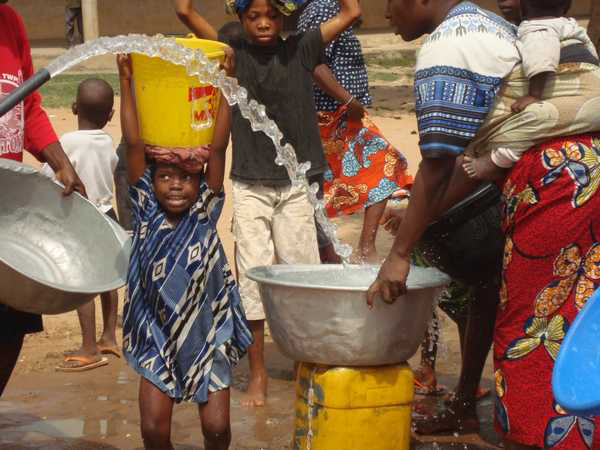
Clean water flowing from one of Ryan’s wells in Togo
Kickass Canadian Ray Zahab, who sits on the board of Ryan’s Well, recommended Ryan as a worthy compatriot. I’m inclined to agree, in spite of Ryan’s insistence that he’s “just an ordinary kid with a simple message: that every person on the planet deserves clean water, and that everyone can help make a difference.”
Compassion. Dedication. Generosity. Humility. If only those things were so ordinary.
That everyone shared such compassion and courage
Inspiration struck when Ryan was a Grade 1 student at Holy Cross Catholic School. His teacher Mrs. Prest told the class that people around the world were dying because they didn’t have clean water to drink. “We didn’t understand why other people didn’t have water,” he says. “So our teacher explained to us that other people had to walk five kilometres for clean water.”
Being First Graders, the children didn’t have a clear sense of how far five kilometres was, so Mrs. Prest explained that it was about 5,000 steps. “I remember I counted the steps it took me to get from my classroom to the water fountain, and I counted 10,” says Ryan. “Something clicked in my mind then, that something as vital as water could be easily available to me, but for other kids it was something (for which) they had to walk a number of steps I couldn’t even count to.”
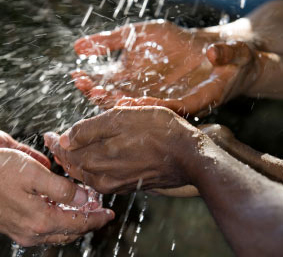
Water flowing from one of Ryan’s wells in Haiti
When he got home from school that day, he announced to his parents, Mark and Susan Hreljac, that he wanted to raise money to build a well in Africa. He spent the next four months earning money by doing extra chores around the house. But after saving the grand sum of $70, he discovered he’d need $2,000 for the well. That meant doing more than household chores; that meant giving talks to raise awareness of his initiative.
The idea would be daunting to almost any six-year-old. It was especially intimidating to Ryan, who was in speech therapy at the time for a speaking impediment. Still, he didn’t let that stand in his way.
First, he gave a presentation to his class, which he says was quite poorly delivered from an elocution standpoint. Then an opportunity arose to speak in front of the Rotary Club of Kemptville. “I did it, and the words might not have come across at all because I had a speech impediment and I was seven,” he says. “But the message did.”
He began gathering followers and supporters of his initiative. Before long, he was giving talks at other area schools, and chatting up his classmates at recess to impress upon them the importance of having clean water.
In 1999, eight-year-old Ryan travelled to Uganda to see what was to become the first of many wells created through his enterprise. “There was this huge celebration,” he says. “There were 5,000 people there, and everyone was so, so happy because they had clean water. There was a feast and dozens of bands that played, and it was unbelievable to think that this was all coming because there was a working well. It helped me put my life in perspective, that’s for sure.”

Ryan at a well in Uganda
That all children could be free and safe
After landing the first drop in Ryan’s mind, Holy Cross Catholic School continued to water the growing initiative. When the first well opened in Uganda, Ryan was in Grade 2. His teacher Mrs. Dillabaugh decided to expand the project by putting each of her students in touch with a pen pal at Angolo Primary School.
Ryan’s pen pal was Jimmy Akana, a boy two years his senior. Not surprisingly, Ryan kept up his correspondence with Jimmy even after the assignment ended, and the two became close friends. When Ryan made his first trip to Uganda for the 1999 well celebration, he and Jimmy had the opportunity to meet.

Jimmy and Ryan
Jimmy showed Ryan around his village and recounted how the well had changed his life. “Before the well got put in, Jimmy used to have to wake up at midnight on school days just to get water,” says Ryan. “He took a huge jerry can, and he had to walk about eight kilometres to the nearest source of water, fill up the jerry cans and walk back, and then do that again, and then do it one more time. And then, he said to me, ‘I had the privilege of going to school.’ Hearing that, for me, it really put things in perspective.”
A couple years later, with Ryan safely home in Canada, Jimmy’s situation took a turn for the worse. The Lord’s Resistance Army was getting more aggressive in its efforts to abduct child soldiers, and in 2003, they raided Jimmy’s village and captured him. “While they were taking everyone else, Jimmy chewed through the ropes on his hands, and ran off to the bushes and escaped,” says Ryan. “When he got back to the village the next day, they had burned it all to the ground.”
The Hreljacs heard about what happened through Ryan’s Well project coordinator Tom Omach. They’d stayed in contact with Jimmy, as friends and also as sponsors; the family sent money for his schooling, because “at the time in Uganda, you had to pay for schooling after Grade 6,” says Ryan. Once they heard about the devastating events in 2003, “we figured we were meant to do more. So we got Jimmy over to Canada on a visitor’s Visa, helped him obtain refugee status, and he’s been with the family ever since.”
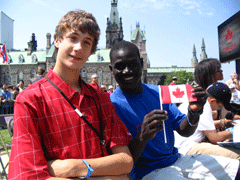
Ryan and Jimmy in front of Parliament Hill, Ottawa, Ont.
Jimmy became a Canadian citizen in 2007, and now has one year left in his undergraduate arts degree at St. Francis Xavier University. He plans to become a teacher, and is actively involved with Ryan’s Well as a speaker on water issues. He’s also an advocate for improving living conditions in Uganda, and was invited to speak at a United Nations symposium on the subject. Ryan is proud to name Jimmy as one of his three brothers, along with Jordan and Keegan Hreljac.
You can read more about Jimmy and Ryan’s story in Herb Shoveller’s 2006 book Ryan and Jimmy and the Well in Africa that Brought Them Together.

‘Ryan and Jimmy and the Well in Africa that Brought Them Together,’ Kids Can Press
That others knew they have the power to make a difference
In spite of everything Ryan has achieved, he still sees himself as a regular kid. “I sleep in, I play sports, I sleep in more, I play video games,” he says. Ryan was “an okay student” at St. Michael Catholic High School. He graduated in 2009, and has just finished his second year at the University of King’s College, where he plays for the Blue Devils basketball team. He’s currently undeclared, but is considering international development and political science. This summer, he’s resumed his position as a coordinator at Camp Oswegatchie, and spends a lot of time volunteering for Ryan’s Well, “speaking, stuffing envelopes, doing whatever I can.”
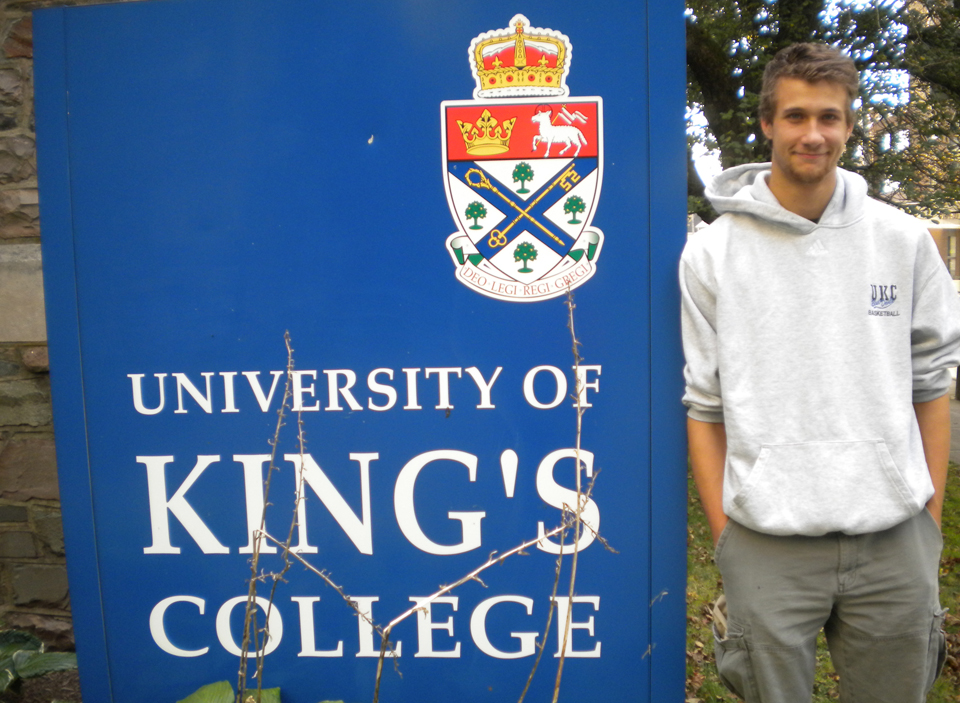
As someone who sees himself as “regular,” he encourages others to believe that everyone can make a difference. He remembers feeling discouraged as a youngster by the idea that, to do good in the world, he had to virtually become a saint. “Growing up, I felt like activism was put up on this pedestal as something that only selfless people can do,” he says. “I felt really discouraged by that, because I love to play video games and hang out with my friends. So I felt like I eventually needed to make this choice in my life. I could either be this person who (devoted himself to) volunteer work, or I could stay at home and sleep.”
Through his work with Ryan’s Well, he realized that the world is made up of mostly “regular” people, but that “everyone has the ability to make a profound impact on the lives of others. That’s the message I try to get other people to realize. Whether the cause is water or something else, just be naïve enough to think like a First Grader.”
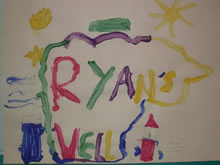
Drawing by a student at Holy Cross Catholic School
That all youth could be as “regular” as Ryan
Despite his best protests, I don’t think there’s any doubt that Ryan carries an extraordinary spark and spirit within him. He just turned 20, and he’s already got an incredible list of accomplishments. As founder and ambassador of Ryan’s Well, he’s visited more than two dozen countries, and made presentations to hundreds of schools, churches and civic clubs, and at dozens of international conferences and global events.
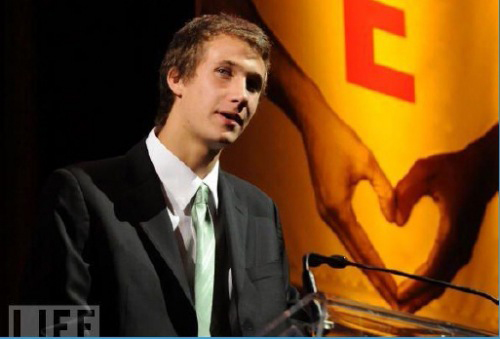
Ryan speaking at the ONEXONE awards, Toronto, Ont. 2008
He has a slew of awards and distinctions to his name. To mention just a few: the Canadian Meritorious Service Medal; Duke of Edinburgh Gold Award; ONEXONE Difference Award; Top 20 Under 20 Award; Planet Africa Group’s Nelson Mandela Humanitarian Award; World of Children Founder’s Award; Gloria Barron Prize for Young Heroes; and CIBC Young Miracle-Maker Award. He was the youngest-ever recipient of the Order of Ontario. He’s also been named a UNICEF Global Youth Leader; United Nations Association in Canada (UNA-Canada) Global Citizen; and one of the CNN Heroes.
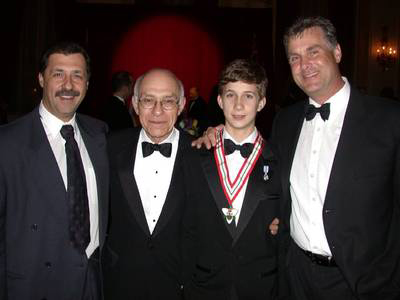
Ryan (second from right) after receiving the Order of Ontario, with father Mark Hreljac (far right)
On top of all that, in 2000, Uganda’s Otwal sub-county declared July 27 to be ‘Ryan’s Day’ in honour of the day his first well opened. In 2006, Ryan became one of the first youth delegates to accompany a Governor General on a State Visit, when he spent 23 days in Africa with former Governor General Michaëlle Jean.
He was also featured twice on The Oprah Winfrey Show. If that weren’t remarkable enough, he actually turned down his first invitation in 2001. Even more remarkable is his reason for saying no: then a Grade 4 student, he had a weekly commitment as a peer helper with the kindergarten students on Thursdays, which was the day Harpo Studios wanted him in Chicago for the show’s taping. At age nine, he understood the importance of honouring his commitments, even at the expense of an appearance on Oprah. Fortunately for the Hreljacs, not long after Ryan politely declined the invitation, the show’s Executive Director called back and rescheduled his interview for the following Tuesday.
Ryan’s humility, and willingness to include and share with others, couldn’t be more perfectly captured than in his current view of the Foundation; in spite of the fact that he founded it, he in no way sees Ryan’s Well as his own. “When I was a kid, I was playing a bigger role with the Foundation,” he says. “When I gave that first speech at the Rotary Club, it became less and less my project and more everyone’s project. Everyone started pitching in in their own way and playing a role. I’ve been playing a role up until now, and if I can continue to do so, then I will.”
That all Canadians would continue to inspire the world
Thanks to Ryan and the thousands of volunteers who have gotten involved with the Foundation, Ryan’s Well has made huge strides in addressing the global water crisis. The World Health Organization (WHO) lists the Foundation as a model for its Healthy Environments for Children Alliance (HECA).
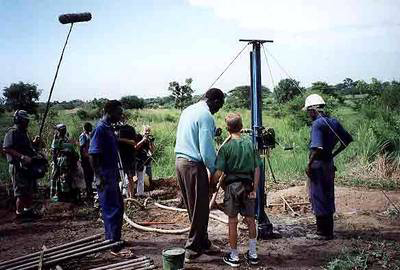
Ryan (second from right) at a well installation in Uganda
Ryan hopes that the initiative will continue to inspire discussion about the water crisis, particularly among Canadians. “We take for granted the fact that we have so much water in our backyard,” he says. “It’s important to start discussing these things now, and be aware of the global situation and aware of our own situation. Water is a valuable resource that should be protected.”
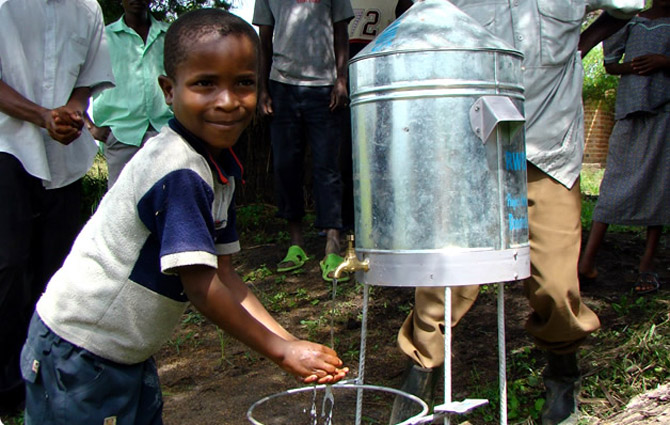
Clean water flowing in Uganda
From his worldly perspective, Ryan sees Canadians as being in a unique position to instigate and lead change. “I’ve loved being Canadian for all my life because it’s an amalgamation (of so many cultures and backgrounds),” he says. “I’m from a small town in Kemptville, but I still feel like I can be a citizen of the world. The most ‘Canadian’ thing you can be is a citizen of the world and a citizen of Canada—the two can go hand-in-hand. I love being Canadian, and I like that Lester B. Pearson mentality; we all live in this world, and as Canadians, we can be forerunners in creating a global identity.
“I think I understood that when I was in Grade 1,” he continues. “I used to think that my community was the only community. When I learned that there was such a disparity between communities (around the world), helping to bridge that gap became the driving force for me and the driving force behind Ryan’s Well. I think lots of kids are doing similar things these days, and I feel like the upcoming generation can become global citizens. Hopefully together we can create a more rounded perspective on the world.”
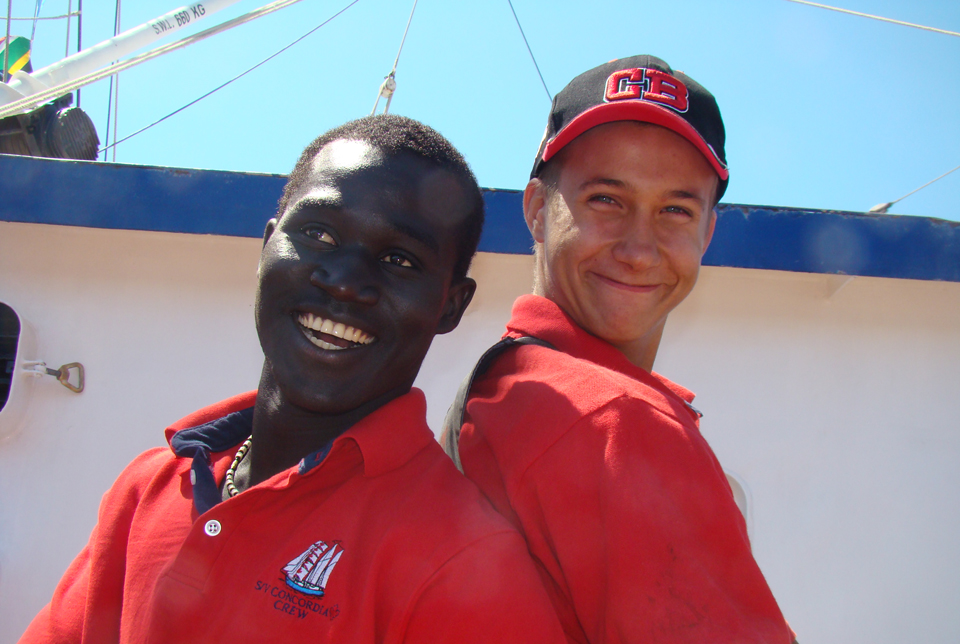
Jimmy and Ryan, 2008
So Ryan continues his legacy, living as a regular kid. Shooting hoops and playing video games. Going to school and working at camp. Volunteering with the Foundation and encouraging his peers to give back.
Wishing well for everyone.
* * *
For the latest on Ryan’s Well, or to get involved with the Foundation, visit ryanswell.ca. You can also ‘Like’ the Foundation’s Facebook page.
 Kickass Canadians
Kickass Canadians
As a former South African, I have witnessed the struggles of poor blacks under apartheid. As a result of oppression and inequity, many blacks lack the basic requirements for life. I wish I could have done more for the poor while in South Africa. I am now an American.
Ryan Hreljac is an inspiration to me and, I am certain, to many others. What a benevolent lad! Canadians, you have cause to be proud! Long live Canadians.
Thanks very much for the comment, Logan! It’s wonderful to know that Ryan’s work is appreciated – and beneficial.
Ryan Hreljac has done a great deal since first hearing about children in other countries who do not have clean water. Ryan and his friends have done a lot to help people get clean water. It is nice that we as Canadians can do an awful lot to help these folks get clean water. Thanks Ryan.
Couldn’t agree more, Thomas. Thanks for your comment!
Great Pics 🙂
I feel bad for all the South Africans who don’t have access to clean water, but Ryan and Jimmy are giving them a chance. Canadians should be proud of Ryan. Water is a right, not a privilege, and Ryan is providing it to people who need it.